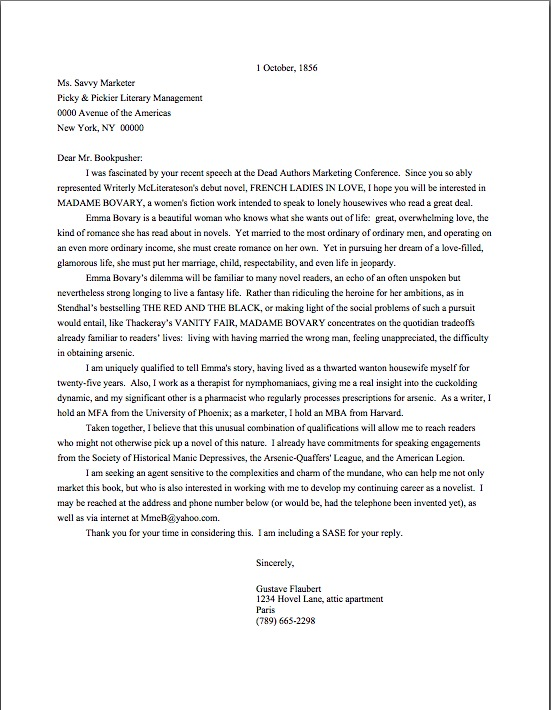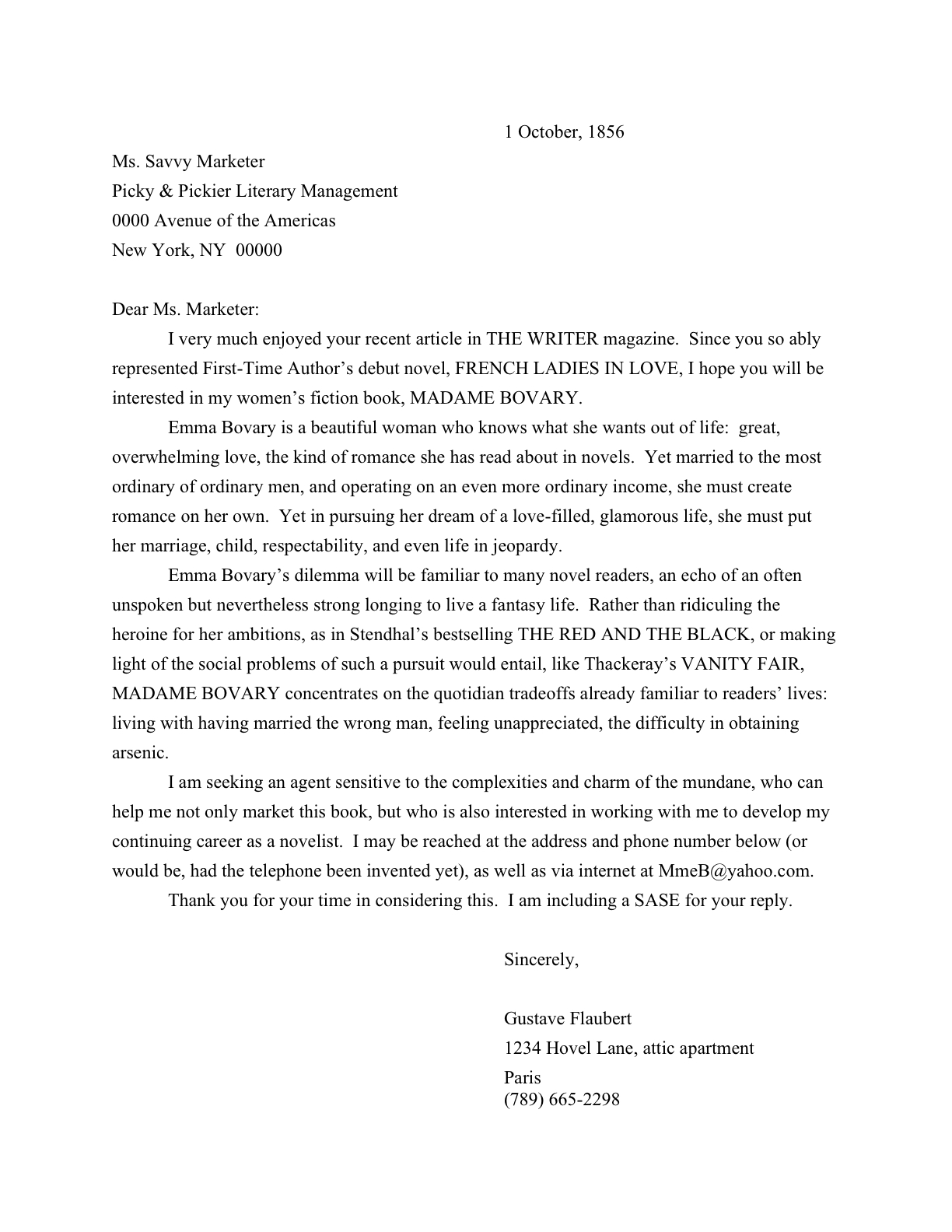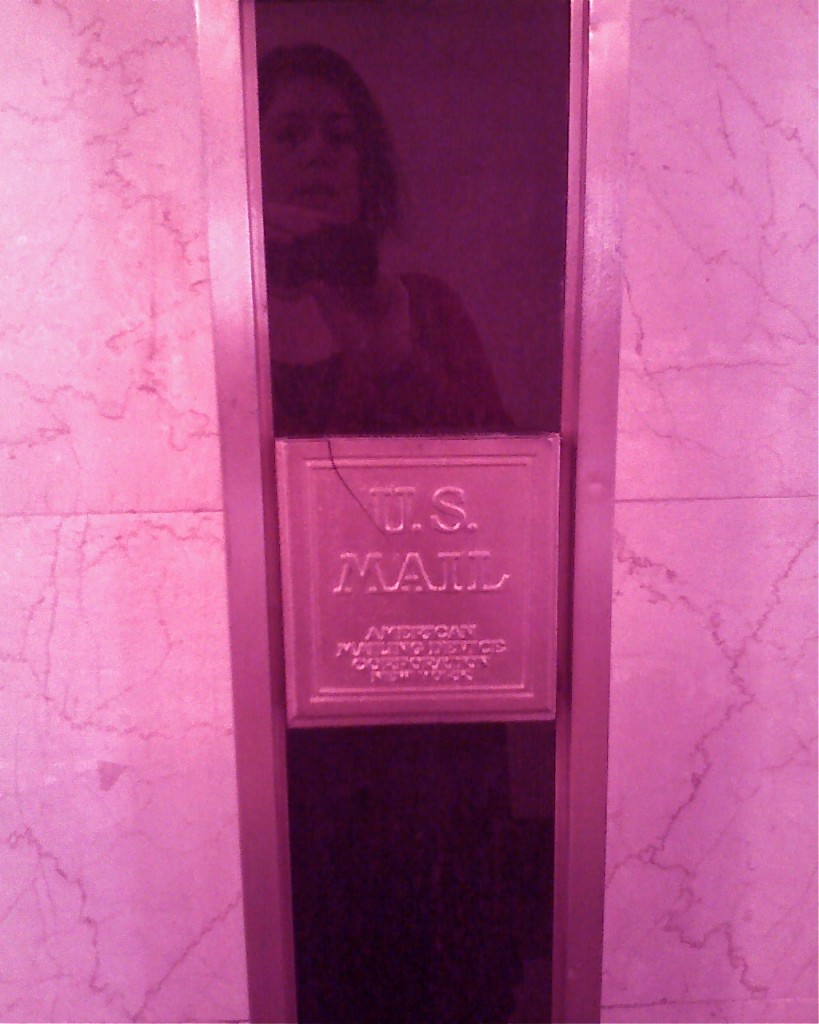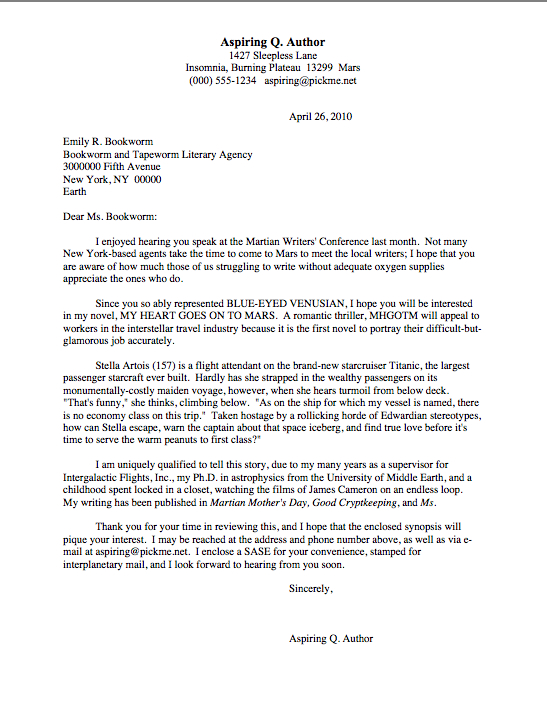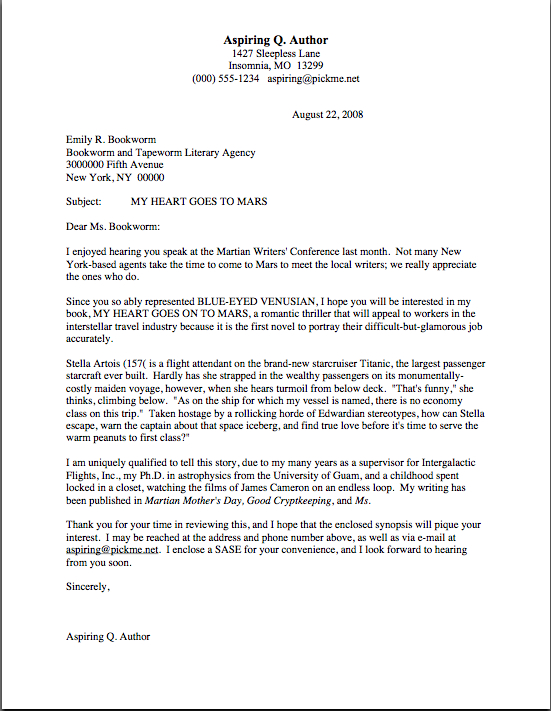
Still hanging in there, campers? Last night, I threw all of you queriers a bit of a curve ball: in the midst of talking about how to polish a basic query letter — polite salutation, title, book category, brief description, writing credentials/platform for writing the book, courteous sign-off, your contact information, SASE if you’re going to send it via mail — I insisted ordered blandished you into suggested that you write it not in your own good prose, but in the language of the publishing industry.
Why might you want to invest the time in doing that? To elevate a ho-hum query that features just the basics into one that veritably leaps off the incoming mail stack at Millicent the agency screener.
That made your eyes pop open this fine morning, didn’t it? “Wait,” some of the bleary-eyed call out, “back up a little. Did you just give a formula for a bare-bones query in the middle of that paragraph? Before I was fully awake? Is that fair?”
Never mind that — you’re beyond basic querying now, my friends. You’ve even, if you have been following Querypalooza with an open heart and inquisitive mind (or even vice-versa) moved past the quite good query letter we discussed in Part I of this series. (Was that only 48 hours ago? This weekend has, I must confess, been a lengthy one for me.) You’re ready to become so conversant with the logic of querying that you could toss out future queries in a pain-free hour or two, instead of an anguish-filled week or month.
And what’s the magic wand that’s going to enable you to make that radical transformation? Learning how to describe your work as an agent or editor would.
The first two steps: nailing down a book category for it and figuring out who your ideal reader is. A savvy querier needs to do more than assert that such a reader exists, however; she must provide some evidence of it.
Which is to say: once you’ve identified your target audience, it’s greatly to your advantage to do a bit of research on just how big it is. Throwing some concrete numbers into your query, demonstrating just how big your target market actually is, will make it MUCH easier for Millicent to talk about your book to higher-ups — and, in turn, for an agent to pitch it to anyone at a publishing house.
Why? Well, sales and marketing departments expect agents and editors to be able to speak in hard numbers — and no matter how much the editors at a publishing house love any given book, they’re unlikely to make an actual offer for it unless the sales and marketing folks are pretty enthused about it, too. So doesn’t it make sense to make sure the agent and editor fighting for your book have that demographic information at their fingertips, when it’s relatively easy for you to put it there?
Some of you are still not convinced that it would behoove you to go to the additional effort, aren’t you? “But Anne,” I hear those of you writing for some of the bigger markets protest. “Surely, everyone with a pulse is aware of how big my particular target audience is and why they would find my book appealing. Wouldn’t it be, you know, a little insulting if my query assumed that the agent wasn’t sufficiently aware of the world around him to know these things?”
Well, yes, if you happen to be pitching a YA book about a teenage girl’s relationship with a vampire or another book whose appeal to a recent bestseller’s already-established readership is so self-evident that any agent with a brain would pitch it as, “It’s basically TWILIGHT, but with twist X…”
But the fact is, few books that aren’t really, really derivative of current bestsellers have that obvious a target audience. Let me tell you a parable about what can happen if a writer is vague about her target market’s demographics.
Aspiring writer Suzette has written a charming novel about an American woman in her late thirties who finds herself reliving the trauma of her parents’ divorce when she was 12. Since the book is set in the present day, that makes her protagonist a Gen Xer, as Suzette herself is. (“It’s sort of autobiographical,” she admits, but only amongst friends.) Like the vast majority of queriers, she has not thought about her target market before approaching agent Briana.
So she’s stunned when Briana tells her that there’s no market for such a book. But being a bright person, quick on her feet, Suzette comes up with a plausible response: “I’m the target market for this book,” she shoots back in an e-mail. (Something a rejected querier should NEVER, EVER do, by the way, but necessary here for the sake of drama.) “People like me.”
Now, that’s actually a pretty good answer — readers are often drawn to the work of writers like themselves — but it is vague. What Suzette really meant was:
“My target readership is women born between 1964 and 1975, half of whom have divorced parents. Just under 12 million Americans, in other words — and that’s just for starters.”
But Briana heard what Suzette SAID, not what she MEANT. Since they’ve just met, how reasonable was it for Suzette to expect Briana to read her mind?
Given this partial information, Briana thought: “Oh, God, another book for aspiring writers.” (People like the author, right?) “What does this writer think my agency is, a charitable organization? I’d like to be able to retire someday.”
And what would an editor at a major publishing house (let’s call him Ted) conclude from Suzette’s statement? Something, no doubt, along the lines of, “This writer is writing for her friends. All four of them. Next!”
Clearly, being vague about her target audience has not served Suzette’s interests. Let’s take a peek at what would have happened if she had been a trifle more specific, shall we?
Suzette says: “Yes, there is a target market for my book: Gen Xers, half of whom are women, many of whom have divorced parents.”
Agent Briana thinks: “Hmm, that’s a substantial niche market. 5 million, maybe?”
Sounding more marketable already, isn’t it?
But when Briana pitches it to editor Ted this way, he thinks: “Great, a book for people who aren’t Baby Boomers. Most of the US population is made up of Baby Boomers and their children. Do I really want to publish a book for a niche market of vegans with little disposable income?”
So a little better, but still, no cigar. Let’s take a look at what happens if Suzette has thought through her readership in advance, and walks into her pitch meetings with Briana and Ted with her statistics all ready to leap off her tongue.
Suzette says (immediately after describing the book in her query): “I’m excited about this project, because I think my protagonist’s divorce trauma will really resonate with the 47 million Gen Xers currently living in the United States. Half of these potential readers have parents who have divorced at least once in their lifetimes. Literally everybody in that age group either had divorces within their own families as kids or had close friends that did. I think this book will strike a chord with these people.”
Agent Briana responds: “There are 47 million Gen Xers? I had no idea there were that many. I want to see the manuscript; this has market potential.”
And editor Ted thinks: “47 million! Even if the book actually appealed to only a tiny fraction of them, it’s still a market well worth pursuing. Yes, Briana, send me that manuscript by your new client.”
The moral of this exciting fairy tale: even the best book premise can be harmed by vague assertions about its target audience; it can only helped by the query’s talking about in marketing terms.
There is one drawback to using up-to-the-minute demographic statistics, of course — if you end up querying the same project over a long period (not at all unusual for even very well-written manuscripts, at this point in literary history), you may have to go back and update your numbers. Actually, it’s not a bad idea to reexamine your query’s arguments every so often anyway. it’s quite easy to fall into the habit of pumping out those queries without really pondering their content — or whether this particular letter is the best means of marketing to that particular agent.
Speaking of which, let’s return to our ongoing query-improvement list.
(10) Have I addressed this letter to a specific person, rather than an entire agency or any agent currently walking the face of the earth? Does it read like a form letter?
Some of you just did a double-take, didn’t you? “But Anne,” you cry in unison, and who could blame you? “I’m experiencing déjà vu. Didn’t we already cover this in #5, Is it clear from the first paragraph that I am querying the appropriate agent for my work?”
Well, yes and no. Yes, I made some suggestions in Querypalooza VI (was that only last night?) for some tried-and-true reasons for explaining why approaching a particular agent makes sense for your book. But no, we didn’t discuss how to fix a generic-sounding first paragraph.
Basically, you fix it by not using the same first paragraph in every query.
As I mentioned in an earlier post in this series, experienced queriers will tweak their basic query letters to personalize them for each agent on their list. Less experienced serial queriers, though, often do not change anything but the first paragraph, address, and salutation between each time they sent out their mailed letters, more or less insuring that a mistake made once will be replicated a dozen times. Copying and pasting the text of one e-mailed query into the next guarantees it.
And those of you who habitually did this were surprised to receive form-letter rejections? The electronic age has made it much, much easier to be dismissive. Although it may seem needlessly time-consuming, it’s worth reviewing every single query to ascertain that the opening paragraph speaks specifically to the recipient’s tastes and placement record.
Most aspiring writers don’t even consider doing this — and frankly, it’s easy to see why. Many approach quite a few agents simultaneously — and with good reason. At this point in publishing history, when many agencies don’t even respond to e-mailed queries if the answer is no, waiting to hear back from one agent before approaching the next is poor strategy. One-by-one queries can add years to the agent-finding process.
Do I sense some restless murmuring out there? “But Anne,” some of you conference veterans protest, “I heard that some agents will become furious if they find out that a writer is sending out many queries simultaneously. I don’t want to scare them away from my book by breaking their rules right off the bat!”
I agree with the general principle imbedded in this cri de coeur — it’s only prudent to check an agency’s website and/or its listing in one of the standard agency guides to ascertain what precisely the agent you are addressing wants to see in a query packet. The differentials can be astonishing: some want queries only, others want synopses, many ask for pages to be placed in the body of an e-mail, a few ask queriers just to go ahead and send the first 50 pages unsolicited.
There is no such thing as a one-size-fits-all query packet. In order not to run afoul of these wildly disparate expectations, a querier must be willing to do a bit of homework and follow individualized directions.
Admittedly, sometimes an agency’s listing in one of the standard guides, its website, and what one of its member agents will say at a conference are at odds. In the event of a serious discrepancy, don’t call or e-mail the agency to find out which they prefer. Go with the information that appears to be most recent — in my experience, that’s usually what’s posted either on the website or on Publisher’s Marketplace.
What no agency will EVER leave off any of its expressions of preference, however, is mention of a policy forbidding simultaneous querying, the practice of sending out queries to more than one agent at a time — if it has one, which is exceedingly rare. Some do have policies against simultaneous submissions, where more than one agent is reading requested materials at the same time, but believe me, the agencies that want an exclusive peek tend to be VERY up front about it.
So If you have checked to ascertain that the agent of your dreams — or at least the next on your list — does not have an exclusivity policy, you should assume that s/he doesn’t. Trust me, if an agent who does prefer an exclusive peek doesn’t want other agents seeing it, s/he will let you know.
Until then, it’s a waste of your valuable time to grant a de facto exclusive to someone who hasn’t asked for it. (For some tips on dealing with an actual request for an exclusive if and when it comes up, please see the EXCLUSIVES TO AGENTS category on the list at right.)
So why does the rumor that that agents secretly crave exclusives (and thus penalize queriers who don’t read their minds and act accordingly) remain so pervasive? Beats me. If I had to guess, I would say that it is an unintended side effect of agents’ standing up at writers’ conferences and saying, “For heaven’s sake, don’t send out mass queries — if I see a query that’s clearly been sent to every agent in the book, I send straight it into the rejection pile.”
In other words, don’t send out generic queries. They’re just not worth your time.
A query letter designed to please all is unlikely to be geared to the specific quirks and literary tastes of any particular agent — one of the many reasons that this shotgun approach seldom works. The other, believe it or not, is that mass submitters often render the fact that they don’t know one agent on their lists from another by sending out what is known in the biz as a Dear Agent letter. As in one that begins:
Dear Agent,
I haven’t the vaguest idea who you are or what you represent, but since the big publishing houses don’t accept submissions from unagented authors, I come to you, hat in hand, to beg you to represent my fiction novel…
Why, when there is so much to resent in this (probably quite honest) little missive, would the salutation alone be enough to get this query rejected without reading farther? Well, to folks who work in agencies, such an opening means only one thing: the writer who sent it is sending an identical letter to every agent listed on the Internet or in one of the standard agency guides.
Willy-nilly, with no regard to who represents what and consequently who is likely to be interested in the book at hand.
Which means, they reason, that it is unlikely to the point of mockery that the book being proposed is going to fit the specific requirements and tastes of any of the agents currently domiciled at the agency. And, most will additionally conclude, the writer hasn’t bothered to learn much about how the publishing industry works. Virtually any Millicent will simply toss it into the reject pile, if not actually the trash. (Dear Agent letter-writers seldom know to include SASEs, alas.)
Since this is such a NOTORIOUS agents’ pet peeve, I’m going to trouble you with yet another question aimed at making that first paragraph a beautiful case that you — yes, you — are the best possible fit for the agent you happen to be querying at the moment. And to make that case pellucidly clear even to a Millicent who has only 30 seconds or so to devote to each query.
(11) Do I make it clear in the first paragraph of the letter SPECIFICALLY why I am writing to THIS particular agent — or does it read as though I could be addressing any agent in North America?
This is a corollary of the last, of course — to put it another way, writers aren’t the only ones screaming at the heavens, “Why me? Why me?” (Agents scream it, too, but with a slightly different meaning.)
No, but seriously, agents (and their screeners) wonder about this. So it’s worth taking a look at your query letter and asking yourself if it answers the question: there are hundreds and hundreds of literary agents in the United States alone — why did you choose this one, out of all others, to query? What specifically about this agent’s track record, literary tastes, and/or bio led you to say, By gum, I would like this person to represent my work?
And no, in this context, because she is an agent and I desperately want to sell my book to a publisher is not a reason likely to impress Millicent. She hears it too often.
The best way to justify your agent choice is by mentioning one of the agent’s recent sales. Remember, agents — like most other people — tend to be proud of their best work: if you want to get on their good side, showing a little appreciation for what they have done in the past is just good strategy. Especially if you can honestly compliment them on a project they really loved, or one that was unusually difficult to sell.
I picked this little trick up not at writers’ conferences, but in academia. When a professor is applying for a job, she is subjected to a form of medieval torture known as a job talk. Not only is she expected to give a lecture in front of the entire faculty that is thinking of hiring here, all of whom are instructed in advance to jump on everything she says with abandon, but she is also expected to have brief private meetings with everyone on the faculty first.
It’s every bit as horrible as it sounds, like going through a series of 20 or 30 interviews with authors who think simply everyone in the universe has read their work. (Everyone smart, anyway.) If you’re the job candidate, you’d better have at least one pithy comment prepared about each and every faculty member’s most recent article, or you’re toast.
Gee, I can’t imagine why I didn’t want to remain in academia. But it did teach me something very valuable indeed: pretty much every human being affiliated with any book ever published likes to be recognized for the fact.
Fortunately, it’s very easy to work a compliment into a query letter without sounding cheesy or obsequious. If the agent you are querying has represented something similar to your work in the past, you have a natural beginning:
Since you so ably represented X’s excellent book, {TITLE}, I believe you may be interested in my novel…”
There are many ways to find out what an agent has represented. Check the acknowledgments of books you like (authors often thank their agents), or check the agency’s website to see whom the agent represents. If all else fails, call your favorite book’s publisher, ask for the publicity department, and ask who the agent of record was; legally, it’s a matter of public record, so they have to tell you.
Actually, with small publishers, this isn’t a bad method for finding out what they are looking to publish. I once had a charming conversation with an editor at a small Midwestern press, who confided to me that when she had acquired the book about which I was inquiring, the author did not yet have an agent. Sensing an opportunity, I promptly pitched my book to her — and she asked me to send her the first fifty pages right away.
Sometimes opportunities are hiding in some unexpected places. For instance…
(12) If I met this agent or editor at a conference, or am querying because I heard him speak at one, or picked him because s/he represents a particular author, do I make that obvious immediately? If I picked him purely because he represents my book category, have I at least made that plain?
Queriers often seem reluctant to mention bring up having heard an agent speak, but since such a low percentage of the aspiring writers out there attend conferences (under 4%, according to the last estimate I saw), attending a good one that the agent you’re querying also attended is in fact a minor selling point for your book.
The prevailing wisdom dictates that writers who make the investment in learning how to market their work professionally tend to have more professional work to present. A kind of old-fashioned notion, true, but if you’re a conference-goer, it’s one you should be riding for all it is worth.
I would suggest being even more upfront than this, if the conference in question was a reputable one and you did in fact attend it. Why not write the name of the conference on the outside of the envelope, in approximately the same place where you would have written REQUESTED MATERIALS had you pitched to the agent successfully there?
And if you are an e-querying type, why not mention it in the subject line of the e-mail? (Also a good idea to include: the word QUERY.)
If you have not heard the agent speak at a conference, read an article she has written in a writer’s magazine or online, or noticed that your favorite author thanked her in the acknowledgments of a book you liked — all fair game to mention in the first line of your query — don’t give in to the temptation not to personalize the first paragraph. Be polite enough to invent a general explanation for why you added her to your querying list:
Since you represent such an interesting array of debut fiction about women in challenging situations, I hope you will be interested in my novel…
(13) Am I sending this query in the form that the recipient prefers to receive it? If I intend to send it via e-mail, have I quadruple-checked that the agency accepts e-mailed queries? If I am sending it via regular mail, have I checked that the agency still accepts paper queries?
Stop laughing, hard-core web fiends. The publishing world runs on paper — even as I write this, it’s still far from unusual for a prestigious agency not to accept e-submissions at all. Even agencies with websites (which not all of them maintain, even today) that accept submissions directly through the website often employ agents who prefer paper queries, even from writers residing in foreign countries for whom getting the right stamps for the SASE is problematic.
Double-check the agency’s policy before you e-query. This information will be in any of the standard agency guides, and usually on the website as well.
If you’re in doubt, query via regular mail — strategically, it’s a better idea, anyway.
it’s far, far less work to reject someone by the press of a single button than by stuffing a response into a SASE. Also, the average reader scans words on a screen 70% faster than the same words on paper. Thus, a truly swift-fingered Millicent can reject 50 writers online in the time that it would take her to reject 10 on paper.
The relative speed of scanning e-queries is why, in case you’re wondering, quite a few of the agencies that actively solicit online queries tend to respond more quickly than those that don’t. Or not at all — which means that it’s also worth your while to check an agency’s policy on responding to e-queries before you approach them; many have policies that preclude responding to a querier if the answer is no.
“But Anne,” I hear many of you shout, “what happens if I accidentally send an e-query to an agent who doesn’t like them, or a paper query to one who prefers to be approached electronically? That won’t result in an automatic rejection, will it?”
Not necessarily, but often. But let me ask you this: who would you prefer to read your letter, an agent calmly going through a stack (or list) of queries, or an agent whose first thought upon seeing your epistle is, “Oh, God, not another one! Can’t any of these writers READ? I’ve said in the last ten years’ worth of Herman’s Guides that I don’t want to be queried via e-mail!”
I don’t know about you, but given my druthers, I would select the former.
Call me old-fashioned, but I believe that just as it’s polite to address a person the way he prefers to be addressed, rather than by a hated nickname, a courteous writer should approach an agent in the manner she prefers to be approached. Those with strong preferences either way seldom make a secret of it; verify before you send.
And before anyone out there asks: yes, most agents will assume that a writer worth having as a client will have gone to the trouble of learning something about their personal preferences. If they have expressed a pet peeve in one of the standard agency guides, they will assume that you are aware of it.
While we’re on the subject of double-checking, allow me to sneak in one more quick question before I sign off for the morning:
(14) Am I absolutely positive that I have spelled the agent’s name correctly, as well as the agency’s? Am I positive that the letter I have addressed to Dear Mr. Smith shouldn’t actually read Dear Ms. Smith? Heck, am I even sure that I’m placing the right letter in the right envelope?
I hear some titters out there, but you wouldn’t BELIEVE how common each of these gaffes is. The last is usually just the result of a writer’s being in a hurry to get the next set of queries in the mail, and tend to be treated accordingly, but the first two constitute major breaches of etiquette.
And yes, an agent with a first name that leaves gender a tad ambiguous is every bit as likely to resent an incorrect salutation as a Rebecca or Stephen would. Often more, because a Cricket, Chris, or Leslie would constantly be receiving queries apparently addressed to someone of the opposite sex.
If you’re in serious doubt, call the agency and ask point-blank whether the agent is a Mr. or Ms. (Quick note for those querying US agents from other parts of the world: currently, Mr. or Ms. are the only two options, unless the person in question happens to be a doctor or a professor; unless a woman makes a point of identifying herself as a Miss or Mrs., Ms. is the proper salutation.)
I know: you’ve heard 4500 times that a writer should NEVER call an agency until after she has a signed representation contract in hand or the agent has left a message asking him to call back, whichever comes first. While it is quite true that allowing the agent to set the level of familiarity in the early stages of exchange is good strategy, most offices are set up to allow a caller to ask a quick, anonymous question, if she’s polite about it. As long as you don’t ask to speak to the agent personally and/or use the occasion to pitch your book, you should be fine.
Have you noticed how many of these tips boil down to some flavor of be clear, do your homework, and be courteous? That’s not entirely accidental: as odd as it may seem in an industry that rejects so many talented people so brusquely, manners honestly do count in this business.
As my grandmother was fond of saying, manners cost nothing. But as I am prone to tell my clients and students, not exhibiting courtesy can cost an aspiring writer quite a lot.
So sit up straight, brush your teeth, and help little old ladies across the street; it will be great practice for working with an agent or editor.
Think we’re at the end of the query-refining questions? Not by a long shot. Tune in at 6 pm for my next installment, and keep up the good work!

